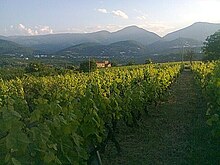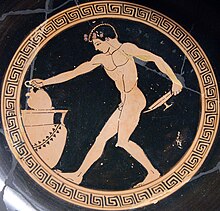LIMSwiki
Contents


Greece is one of the oldest wine-producing regions in the world and among the first wine-producing territories in Europe.[1][2][3][4] The earliest evidence of Greek wine has been dated to 6,500 years ago[5] [6] where wine was produced on a household or communal basis. In ancient times, as trade in wine became extensive, it was transported from end to end of the Mediterranean; Greek wine had especially high prestige in Italy under the Roman Empire. In the medieval period, wines exported from Crete, Monemvasia and other Greek ports fetched high prices in northern Europe.[7][8]
History


The origins of wine-making in Greece go back 6,500 years[9][10] and evidence suggesting wine production confirm that Greece is home to the second oldest known grape wine remnants discovered in the world[6][9][11] and the world's earliest evidence of crushed grapes.[9] As Greek civilization spread through the Mediterranean, wine culture followed.[12] The Ancient Greeks introduced vines such as Vitis vinifera[12] and made wine in their numerous colonies in Italy,[13] Sicily,[14] southern France,[15] and Spain.[12]
In 1937, a Wine Institute was established by the Ministry of Agriculture. During the 1960s, retsina suddenly became the national beverage. With rapidly growing tourism, retsina became associated worldwide with Greece and Greek wine. Greece's first Cabernet Sauvignon vineyard was planted in 1963. In 1971 and 1972, legislation established appellation laws.[16][17][18]
Wine regions
A system of appellations was implemented to assure consumers the origins of their wine purchases. The appellation system categorizes wines as:[19][20]
- Protected Geographical Origins (P.D.O), i.e. an Appellation of Origin of Superior Quality
- Protected Geographical Identification (P.G.I.), i.e. a Quality wines of Origin
- Epitrapezios Oinos, i.e. a vin de table – Not certified wine in a region of Greece (that does not reflect the real wine quality)
The main wine growing regions – so called appellations of Greece – are:[20]
Aegean Islands





Crete
Epirus
Ionian Islands
Macedonia
- Amyntaio (Amyndeon)
- Epanomi [25]
- Goumenissa
- Naoussa
- Pieria
- Chalkidiki
Central Greece
Peloponnese
- Mantineia
- Nemea
- Monemvassia-Malvasia
- Patras
Thessaly
- Nea Anchialos
- Rapsani
- Messenikola
Grape varieties

Greece has approximately 200 vine varieties:[27]
Red wine
- Agiorgitiko ("St. George's grape") is a variety native to Nemea that grows mainly in the Peloponnese area, producing a soft, fruity red in many styles. Its sensory attributes are similar to Beaujolais Nouveau but, unlike its French counterpart, the St. George ages well for about five years.
- Kotsifali is a variety mainly grown on Crete. It is blended with Mandilaria or Syrah to enhance its color.
- Liatiko is a red variety native to Crete. It is characterised by flavors of red fruit and spices, and is deemed to be at its best when made as a sweet wine.[28] Historically, the grape was used in blends with Mandilaria and Kotsifali to produce Malvasia, a highly regarded, sweet red wine that was widely exported by Venetian traders during the Middle Ages.
- Limnio, or Kalambaki, is an important red grape variety that is indigenous to the Aegean island of Lemnos and has been used in red wine production for more than 2000 years. As a varietal wine, Limnio is full-bodied, high in alcohol and very herbaceous, with a distinctive taste of bay leaves.
- Mandilaria, also known as amorgiano, is mainly cultivated on the islands of Rhodes and Crete. Wine from this grape is often very tannic and frequently blended with other grapes to soften the mouthfeel.
- Mavrodaphne, or "black laurel", is a variety that grows in the Peloponnese and the Ionian Islands. It is blended with the Black Corinth currant grape to produce a prized fortified dessert wine made in the Solera style.
- Mavroudi[29][30] is one of the oldest Greek grape varieties and supposedly the one on which Odysseus got Polyphemus drunk. It is found in Thrace but also in central Greece and the Peloponnese.
- Negoska is found in Northern Greece and also produces rose and red wines of carbonic maceration worth mentioning, with the expected aromas. blended into the PDO Goumenissa wine.
- Romeiko is a red grape generally found on Crete, most prominently in the region of Chania.[31]
- Vertzami is a thick, dark-skinned grape variety, best known for single-varietal wines produced on the Ionian island of Lefkada. It is also grown in central Greece and Peloponnese, where it is often blended with other Greek wines, and Cyprus, where it is known as "Lefkas".[32]
- Xinomavro ("sour black") is the predominant grape variety in Macedonia, centered on the town of Naousa. This variety has great aging potential with a palate reminiscent of tomatoes and olives, and a rich tannic character. It is often compared to Nebbiolo.

White wine
- Assyrtiko is a multi-purpose variety which maintains its acidity as it ripens. It is similar in character to Riesling, and is mostly island-based, being a native variety of the island of Santorini, whose old vines have been resistant to Phylloxera.
- Athiri is a lower acid variety and one of the most ancient. Originally from Santorini, it is now planted in Macedonia, Attica, and Rhodes.
- Debina is a white Greek wine grape primarily in the Zitsa region of Epirus. The grape's high acidity lends itself to sparkling wine production.
- Lagorthi is a variety mainly cultivated on high slopes (850 meters) in the Peloponnese. The grape produces a very malic and fruity wine.
- Malagousia is a grape growing mainly in Macedonia, with a special aroma leading to elegant full bodied wines, with medium-plus acidity and exciting perfumed aromas.
- Moschofilero is a Blanc de gris variety from the AOC region of Mantineia, in Arcadia in the Peloponnese. Its wines offer a crisp and floral character in both still and sparkling styles.
- Robola is most grown in the mountainous vineyards of the Ionian Island of Cephalonia. It has a smokey mineral and lemony character, excellently complementing seafood.
- Roditis (the "pink" or "rose" grape) is a grape that is very popular in Attica, Macedonia, Thessaly, and the Peloponnese. This variety produces elegant, light white wines with citrus flavors.
- Savatiano (the "Saturday" grape) is the predominant white grape in the region of Attica, where it displays excellent heat resistance and shows a distinct floral and fruity aroma when cold fermentation is practised.[33] When fermented without cooling, it makes retsina or rustic unresinated wines that complement Mediterranean dishes well.
- Vidiano is a white grape indigenous to Crete. It has complex aromas of peach, apricot, melon, honey and herbs, along with moderate acidity. The grape is difficult to cultivate and is grown in small scale, chiefly around Rethymno and Heraklion.
References
- ^ "Main Greek Grape Varieties". visitgreece.gr. Archived from the original on 2023-12-10.
- ^ "Greek Wines (varieties and appellations)". TasteAtlas. Archived from the original on 2024-03-09.
- ^ "Greece Wines Map". Greek National Tourism Organisation. Archived from the original on 2024-03-09 – via Issuu.
- ^ Horsley, Matthew (2021-05-05). "The ultimate guide to Greek wine". Archived from the original on 2024-02-05.
- ^ "Ancient Mashed Grapes Found in Greece". Discovery, Inc. Archived from the original on 2008-01-03.
- ^ a b "Mashed grapes find re-write history of wine". Zee News. Archived from the original on 2007-12-27.
- ^ "Greek Wine Regions - Country Greece". winetourism.com. Archived from the original on 2022-09-07. Retrieved 2022-11-07.
- ^ "Greek sweet wines". visitgreece.gr. Archived from the original on 2023-12-01.
- ^ a b c "6,500-year-old Mashed Grapes Found in Greece". Archived from the original on 2012-10-08.
- ^ "6,500-year-old Ancient Mashed Grapes Found in Greece - World's earliest evidence of crushed grapes". megalithic.co.uk. Archived from the original on 2023-06-05.
- ^ "6500-year-old Mashed grapes found". Archived from the original on 2007-03-20.
- ^ a b c Introduction to Wine Laboratory Practices and Procedures, Jean L. Jacobson, Springer, p. 84.
- ^ The Oxford Companion to Archaeology, Brian Murray Fagan, 1996 Oxford Univ Pr, p. 757.
- ^ Wine: A Scientific Exploration, Merton Sandler, Roger Pinder, CRC Press, p. 66.
- ^ Medieval France: an encyclopedia, William Westcott Kibler, Routledge Taylor & Francis Group, p. 964.
- ^ "Greek Organic Wines". Archived from the original on 2023-12-08.
- ^ "Cabernet Sauvignon: one of the best international varieties of the Greek vineyard" (in Greek). 1 December 2022. Archived from the original on 2023-03-20.
- ^ "Cabernet Sauvignon". Archived from the original on 2023-12-11.
- ^ "The Greek wine law". symposio.com. Archived from the original on 2011-07-16.
- ^ a b "Greece wines". wein-plus.eu.
- ^ "Wines of Rhodes". visitgreece.gr. Archived from the original on 2023-10-02.
- ^ "Wines of Santorini island". visitgreece.gr. Archived from the original on 2023-06-04.
- ^ "Wines of Crete". visitgreece.gr. Archived from the original on 2023-10-02.
- ^ "The wines of Epirus". visitgreece.gr. Archived from the original on 2023-10-02.
- ^ "Winemaking region Macedonia". allaboutgreekwine.com. Archived from the original on 2020-04-08.
- ^ "Attica's Vineyards". visitgreece.gr. Archived from the original on 2023-05-30.
- ^ "Vine varieties database - Greece". International Organisation of Vine and Wine. Archived from the original on 2 September 2024. Retrieved 2 September 2024.
- ^ "Liatiko". winesofgreece.com. Archived from the original on 2023-03-28.
- ^ "Greek grape varieties". Archived from the original on 2023-06-09.
- ^ "Grape Varieties in North Greece". Archived from the original on 2024-03-09.
- ^ Lazarakis, Konstantinos (2018-01-22). The wines of Greece. Infinite Ideas. ISBN 9781910902691.
- ^ "Vertzami". wine-searcher.com. 2014-10-29. Archived from the original on 2021-02-04.
- ^ Shara Hall, Lisa, "Guide to Greek Wine", Epikouria Magazine, Spring/Summer 2006
Further reading
- Dalby, Andrew (2003), Food in the ancient world from A to Z, London, New York: Routledge, ISBN 0-415-23259-7
- Dalby, Andrew (1996), Siren Feasts, London, New York: Routledge, ISBN 0-415-11620-1 (Paperback ISBN 0-415-15657-2)
- Lambert-Gócs, Miles (1990), The Wines of Greece, London: Faber, ISBN 0-571-15388-7

















